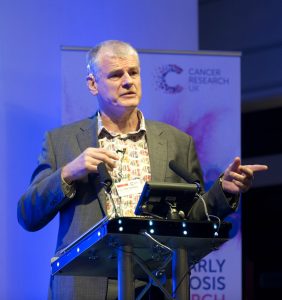Back to the future for early diagnosis in primary care
At the CRUK Early Diagnosis Research Conference today, CanTest Director of Research Prof Willie Hamilton CBE, gives a keynote speech on how the diagnosis of symptomatic cancer in primary care has changed over the last 15 years and, using his crystal ball, considers what might happen in the coming years.
 In the 1990s, before anyone had heard of Cancer Plans, Two-week waits (2WW) or Rapid Diagnostic Centres, cancer was still part of general practice. But an ordinary, everyday, part. Of course it mattered, but it wasn’t special. And our country’s survival figures were poor.
In the 1990s, before anyone had heard of Cancer Plans, Two-week waits (2WW) or Rapid Diagnostic Centres, cancer was still part of general practice. But an ordinary, everyday, part. Of course it mattered, but it wasn’t special. And our country’s survival figures were poor.
Now, we have over 2 million two-week wait appointments each year, improving survival, improving stage at diagnosis and fewer emergency admissions. These developments are very encouraging but can we do better? During his presentation, Prof Hamilton considers this question and also asks – will rapid diagnosis centres make a further shift in earlier diagnosis? What impact will liquid biopsies have on early detection, prognosis and personalised treatment? Can medical detection dogs sniff out hard to detect cancers?
Prof Hamilton is speaking at this year’s CRUK Early Diagnosis Research Conference, which is being held at the Hilton Birmingham Metropole. This year sees a number of seasoned CanTest academics, along with some of our early career researchers both presenting and chairing sessions throughout the event.
CRUK have hosted conferences on early diagnosis research for a number of years. They have covered a broad range of themes and attract researchers, clinicians, patients and policymakers from across the early diagnosis community. They discuss the latest research findings, their implications on policy and practice, and the future needs and direction for early diagnosis. This year’s theme is ‘10 years on: accelerating early diagnosis evidence into practice’.


